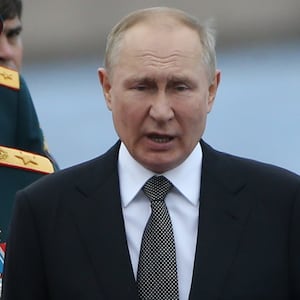The Kremlin has been icing out Russian politicians who have criticized the course of the war in Ukraine in recent days, blocking state media from quoting them even as Russian losses stack up, according to Russian news outlet Verstka.
The Kremlin has zeroed in on silencing a group of State Duma deputies who have been critical of the war and Russia’s military in recent months, according to Verstka, which cites a source close to the lower house and a source familiar at a media operation that received the instructions.
The list, which the first deputy head of the presidential administration Sergei Kiriyenko reportedly made, includes the head of the Duma's Defense Committee, Andrei Kartopolov, who last month called for the Kremlin to “stop lying” to the Russian people about the casualties Moscow has sustained in the war.
A senior member of the lower house of Russia’s parliament, Andrei Gurulev, is also on the alleged blacklist. Gurulev said that Russia’s defeat in Lyman just weeks after Ukraine’s successful counteroffensive in Kharkiv was a product of those surrounding Russian President Vladimir Putin being too fearful to bring him bad news.
“It’s a problem of total lies and positive reports from top to bottom,” Gurulev said.
The Kremlin has reportedly targeted at least three others for ostracism in state media, including Viktor Zavarzin, a deputy of the State Duma and member of the defense committee who has criticized sending children to war and has suggested the war effort is flagging. Andrei Krasov—who is Kartapolov’s first deputy and in charge of Russia’s political aims in Zaporizhzhia—and Nina Ostanina, the head of the committee on family, women and children who discussed ending Russia’s “partial mobilization” in October, are also named.
Moscow’s apparent blacklisting effort is just the latest sign the Kremlin has grown increasingly desperate for support back home and sensitive to criticism as setbacks and losses have exposed how poorly planned and executed Russian President Vladimir Putin’s war in Ukraine is.
While many Russian politicians, Putin allies, and military bloggers at first chest pumped along with Putin about the war in Ukraine, some have grown increasingly skeptical of the war effort. The war has dragged on into its ninth month, with disintegrating logistics, mounting losses, and an unpopular partial military mobilization that has sent more Russian men to the front with minimal training—and which has sent many more fleeing Russia entirely to avoid conscription.
Russia’s attempt to hold sham referenda and illegally annex territories in Ukraine quickly revealed they did not know what territory they actually controlled. The whole botched takeover attempt was followed by a quick series of Russian defeats in those territories.
According to the U.K., domestic dissent against Putin in Russia is growing by the day.
“The failures of Putin’s horrendous adventurism are becoming increasingly apparent to the Russian people,” Ian Stubbs, the U.K. envoy to the Organization for Security and Cooperation in Europe, said in remarks Wednesday. “They are becoming increasingly aware that their recently mobilized family members, neighbors and friends are being badly trained, badly equipped and then sent to the battlefield to reinforce poorly equipped, poorly led and demoralized professional soldiers.
Several of Putin’s close allies, including Chechen Leader Ramzan Kadyrov and the head of the Wagner Group mercenaries, Yevgeniy Prigozhin, have begun circling the wagons as Putin’s grasp on the original war goals has grown dubious. Western officials say that Prigozhin’s influence is growing, as he is increasingly taking on duties central to the functioning of the Russian state. Putin’s backing from a small circle international partners, such as China and India, has also begun to dry up.
Putin critics and former Russian politicians opposed to his leadership have gathered in recent days in Poland to discuss what a Putin ouster might look like.
The crackdown also comes in part because the Kremlin has failed to cement a messaging strategy and sell it to leadership throughout Russia. Although the Russians have generally been working to spread pro-Russia and anti-Ukraine propaganda about the war, many Russian politicians have been commenting on topics that paint Moscow in a bad light, without much guidance from the Kremlin and too much “independence,” according to Verstka. Kartapolov, for instance, discussed publicly whether there should be personnel changes in the military given poor conditions on the front for Russian troops.
Nonetheless, some of the criticism has appear to strike a chord among Putin’s allies as the Kremlin seeks to prevent a complete meltdown of authority in Moscow and shore up its control on the narrative about the war.
Gurulev, one of the politicians on the new blacklist, criticized Russia’s performance when it lost Lyman to Ukrainian forces and suggested Russia should pin the blame on the commander of the Central Military District, Alexander Lapin. Just last week, Russia replaced Lapin with Major General Alexander Linkov, according to British intelligence.
But the realities of the war—and increasingly successful Ukrainian attacks on Russian military entities and key logistics routes, including on the Kerch Bridge to Crimea—are making it increasingly difficult for Russia to spin its current approach as a comeback, according to a British intelligence assessment issued Wednesday.
“The damage to the bridge, the recent attack on the Black Sea Fleet in Sevastopol and the probable withdrawal from Kherson all complicate the Russian government’s ability to paint a picture of military success,” the intelligence analysis said.








